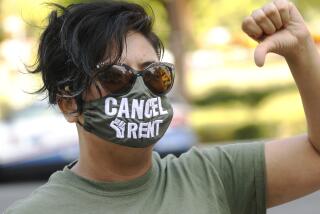San Marino Council Puts Off Vote on Limiting Security Signs
- Share via
After San Marino homeowners and security firms sounded the alarm over a proposed local law to limit the number of security signs, the City Council responded Wednesday by putting off a vote on the law until February.
Council members told more than 60 residents packing the council chamber that they need time to study the issue. Some members, however, said they back restrictions.
“We are not trying to outlaw the signs,” said Councilman Paul Crowley, noting that the council has thus far overlooked the fact that the signs already violate an existing ban on all non-real estate lawn signs. “We want to legalize the signs. We are trying to get a little control over a few abuses.”
Security company officials, who oppose the proposal, said the council’s decision was the only reasonable response to overwhelming citizen opposition. “They did a lot of damage control tonight,” said Ted Willie of POST Alarm.
The council earlier this year proposed the ordinance limiting most homes to one sign visible from the street and no more than 10 feet from the building after some residents complained that the security signs had become an eyesore in the image-conscious town.
Several council members suggested that they might seek to restrict what appears on the signs, saying some appear to be advertising. “There are some signs with just the name of the company and no [telephone] number at all,” said Mayor Vince Filutze.
The ordinance, proponents contended, is in keeping with the ethos of the exclusive enclave of upscale living where residents can even be cited for a dead lawn.
But the proposed ordinance unsettled homeowners in a city where every other household contracts with a security firm. They accused city officials of placing appearances ahead of safety and threatened to hold the city responsible for property crimes.
“If you’ve got a 75-year-old widow sitting at home and she wants six signs, God bless her,” said resident Bill Tappin, who was among more than a dozen residents who spoke against the proposal.
More to Read
Sign up for Essential California
The most important California stories and recommendations in your inbox every morning.
You may occasionally receive promotional content from the Los Angeles Times.














